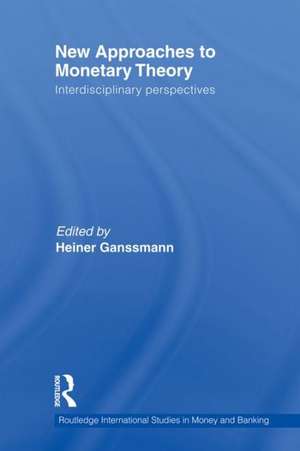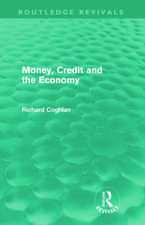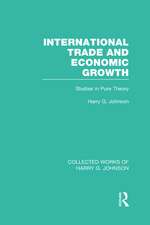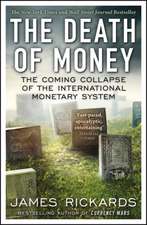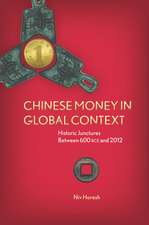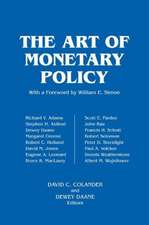New Approaches to Monetary Theory: Interdisciplinary Perspectives: Routledge International Studies in Money and Banking
Editat de Heiner Ganssmannen Limba Engleză Hardback – 21 mar 2011
Recently, there has been a revival of interest in monetary theory, not least because the impacts of globalizing markets and of new communication and information technologies have changed the forms of money. The deep crisis of the financial system has demonstrated the importance of a functioning monetary system and although renewed interest in this has led to significant contributions in various fields, it remains true that no social science discipline on its own is sufficiently equipped to explain the basic workings of monetary systems, their rapid innovation and their effects on social, economic and political structures.
The contributors to this book report on their latest research on the origins of money, on the nature of monetary transactions, on money and the state, and on the role of money and finance in the recent global crisis. They show how established theories of money and the policies guided by these theories went wrong. This collection will be a valuable resource for students and researchers seeking a deeper understanding of money.
Din seria Routledge International Studies in Money and Banking
-
 Preț: 309.94 lei
Preț: 309.94 lei -
 Preț: 325.16 lei
Preț: 325.16 lei -
 Preț: 284.40 lei
Preț: 284.40 lei -
 Preț: 313.60 lei
Preț: 313.60 lei -
 Preț: 311.41 lei
Preț: 311.41 lei -
 Preț: 307.47 lei
Preț: 307.47 lei -
 Preț: 313.17 lei
Preț: 313.17 lei -
 Preț: 341.57 lei
Preț: 341.57 lei -
 Preț: 309.87 lei
Preț: 309.87 lei -
 Preț: 310.84 lei
Preț: 310.84 lei - 9%
 Preț: 864.85 lei
Preț: 864.85 lei -
 Preț: 664.77 lei
Preț: 664.77 lei - 18%
 Preț: 1175.01 lei
Preț: 1175.01 lei - 18%
 Preț: 1122.64 lei
Preț: 1122.64 lei - 18%
 Preț: 1056.00 lei
Preț: 1056.00 lei - 18%
 Preț: 1067.14 lei
Preț: 1067.14 lei - 27%
 Preț: 148.98 lei
Preț: 148.98 lei - 27%
 Preț: 503.80 lei
Preț: 503.80 lei - 18%
 Preț: 1058.79 lei
Preț: 1058.79 lei - 26%
 Preț: 820.40 lei
Preț: 820.40 lei - 18%
 Preț: 1058.79 lei
Preț: 1058.79 lei - 28%
 Preț: 821.46 lei
Preț: 821.46 lei - 18%
 Preț: 1057.40 lei
Preț: 1057.40 lei - 31%
 Preț: 765.01 lei
Preț: 765.01 lei - 18%
 Preț: 1056.28 lei
Preț: 1056.28 lei - 15%
 Preț: 254.03 lei
Preț: 254.03 lei - 18%
 Preț: 1064.70 lei
Preț: 1064.70 lei - 18%
 Preț: 1113.25 lei
Preț: 1113.25 lei - 18%
 Preț: 702.31 lei
Preț: 702.31 lei - 18%
 Preț: 1166.68 lei
Preț: 1166.68 lei - 30%
 Preț: 849.37 lei
Preț: 849.37 lei - 18%
 Preț: 1116.38 lei
Preț: 1116.38 lei - 30%
 Preț: 851.99 lei
Preț: 851.99 lei - 18%
 Preț: 1060.87 lei
Preț: 1060.87 lei - 28%
 Preț: 823.57 lei
Preț: 823.57 lei - 18%
 Preț: 1114.70 lei
Preț: 1114.70 lei - 29%
 Preț: 1188.26 lei
Preț: 1188.26 lei - 28%
 Preț: 853.07 lei
Preț: 853.07 lei - 18%
 Preț: 1114.30 lei
Preț: 1114.30 lei -
 Preț: 418.22 lei
Preț: 418.22 lei - 30%
 Preț: 854.10 lei
Preț: 854.10 lei - 18%
 Preț: 1060.25 lei
Preț: 1060.25 lei - 18%
 Preț: 1165.73 lei
Preț: 1165.73 lei - 18%
 Preț: 1056.00 lei
Preț: 1056.00 lei - 30%
 Preț: 851.82 lei
Preț: 851.82 lei - 18%
 Preț: 1059.48 lei
Preț: 1059.48 lei - 18%
 Preț: 1240.95 lei
Preț: 1240.95 lei - 29%
 Preț: 1187.46 lei
Preț: 1187.46 lei
Preț: 824.53 lei
Preț vechi: 1105.51 lei
-25% Nou
Puncte Express: 1237
Preț estimativ în valută:
157.82€ • 171.49$ • 132.66£
157.82€ • 171.49$ • 132.66£
Carte tipărită la comandă
Livrare economică 21 aprilie-05 mai
Preluare comenzi: 021 569.72.76
Specificații
ISBN-13: 9780415595254
ISBN-10: 0415595258
Pagini: 292
Ilustrații: 1 table and 8 line drawings
Dimensiuni: 156 x 234 x 33 mm
Greutate: 0.71 kg
Ediția:1
Editura: Taylor & Francis
Colecția Routledge
Seria Routledge International Studies in Money and Banking
Locul publicării:Oxford, United Kingdom
ISBN-10: 0415595258
Pagini: 292
Ilustrații: 1 table and 8 line drawings
Dimensiuni: 156 x 234 x 33 mm
Greutate: 0.71 kg
Ediția:1
Editura: Taylor & Francis
Colecția Routledge
Seria Routledge International Studies in Money and Banking
Locul publicării:Oxford, United Kingdom
Public țintă
Postgraduate and UndergraduateCuprins
1. Introduction Heiner Ganssmann 2. The Role and the Place of Money and Credit in the Economy of Ancient Mesopotamia Johannes Renger 3. The Greek Invention of Money Richard Seaford 4. Explaining the Origin of Money: Interdisciplinary Perspectives N. Emrah Aydınonat 5. Weber’s ‘Last Theory of Capitalism’ and Heterodox Approaches to Money and Finance John Smithin 6. Money and Sovereignty: A Comparison between Hobbes and Modern Money Theory Jean Cartelier 7. Statistical Mechanics Approach to the Probability Distribution of Money Victor M. Yakovenko 8. Money, Credit and the Structures of Social Action Heiner Ganssmann 9. Money, Liquidity and Price Bruce G. Carruthers 10. Understanding Modern Money: How A Sovereign Currency Works L. Randall Wray 11. Monetary Equivalence and Functionalism: Implications for Central Banking Dick Bryan and Mike Rafferty 12. From Marx to Minsky: The Universal Equivalent, Finance to Production and the Deepening of the Real Subsumption of Labour under Capital Riccardo Bellofiore 13. Money, Expectations, Physics and Financial Markets: Paradigmatic Alternatives in Economic Thinking Hansjörg Herr 14. The Second End of Laissez-Faire: The Bootstrapping Nature of Money and the Inherent Instability of Capitalism Katsuhito Iwai
Notă biografică
Heiner Ganssmann is Professor Emeritus at the Department of Sociology at the Free University of Berlin, Germany.
Descriere
Everybody uses money every day, but we rarely stop to think about how money works. In this book, scholars from different disciplines seek to answer that question; from historians to economists, sociologists, a philosopher and a physicist.
